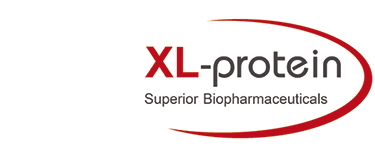XL-protein and Wacker Biotech produce a PASylated antibody fragment (Fab) with prolonged plasma half-life at more than four grams per liter culture in an E. coli expression system
High Yield with ESETEC® and PASylation®: Wacker Biotech and XL-protein Produce More than Four Grams per Liter of Fab Antibody Fragment with Prolonged Plasma Half-Life
Munich, Jena and Freising, April 18, 2013 – In the course of their
collaboration, Wacker Biotech and XL-protein have produced record yields of a PASylated Fab antibody using WACKER’s E. coli based ESETEC® secretion technology. WACKER developed an efficient bacterial cell line and was able to produce the Fab antibody in concentrations of more than four grams per liter of culture broth. This Fab antibody is being tested as a novel therapeutic agent for treating autoimmune diseases. These results open up new opportunities for developing monovalent antibody drugs that can be produced at lower cost, with fewer side-effects and with a tunable plasma half-life. As part of their recent collaboration agreement, WACKER and XL-protein are offering pharmaceutical customers access to the combination of the PASylation® platform and the ESETEC® technology. WACKER also has the necessary expertise for GMP-compliant production of biologics.
In a feasibility study, Wacker Biotech and XL-protein tested the use of WACKER’s patented ESETEC® technology to produce PASylated Fab antibody fragments for the development of new drugs to treat autoimmune
diseases. The study not only confirmed that the biopharmaceutical can be produced in high yield (4.3 g/l) by the patented ESETEC® technology. It also demonstrated that correctly folded, fully functional antibody fragments are efficiently secreted into the culture broth – this greatly simplifies downstream purification. Detailed biochemical characterization revealed monodispersity of the product and excellent antigen-binding activity.
For many years, antibody products have been a promising growth area for the pharmaceutical industry. Antibodies are highly specific in their ability to intervene with disease mechanisms, and they usually circulate in the body for several weeks. However, in certain indications, some of their features can be detrimental: stimulation of the immune system via the antibody effector region; bivalent binding or crosslinking of the antigen; or the antibodies’ long biological half-life. XL-protein therefore decided to develop a monovalent antigen-binding antibody fragment (Fab) that does not bind immunoreceptors and promises fewer sideeffects. Furthermore, PASylation® prolongs its plasma half-life and thus allows for optimal tuning of drug activity. Fab fragments are derived from human antibodies and can be manufactured as separate recombinant proteins. One of their advantages over full-length antibodies is an improved ability to penetrate the diseased tissue. Since Fabs are not glycosylated, they can be produced cost-effectively in microbial organisms such as E. coli. Nonetheless, Fab antibody fragments are much more difficult to produce than other therapeutic proteins, as they are composed of two different protein subunits and contain several disulfide bridges. So far, conventional production methods have yielded less than 2 grams per liter of culture.
“We are delighted – the results open up new avenues for the development of antibody products,” says Dr. Thomas Maier, managing director of Wacker Biotech. “ESETEC® produces Fab antibody fragments in record yields that until now had only been possible for whole antibodies using mammalian cell cultures. Yet, development and production times with ESETEC® are much faster than with mammalian cells. This saves our customers costs and shortens the time to market.” ESETEC® is a proprietary WACKER technology with a track record of cost-effective production of proteins and antibody fragments. It is based on an E. coli K12 strain which has the ability to secrete correctly folded recombinant proteins into the culture broth during fermentation. Secretion facilitates purification of the target protein, since there is no longer any need for complicated process steps such as homogenization and refolding. This makes the entire manufacturing process significantly more efficient and cost-effective. A number of biologics that have been manufactured with ESETEC® are already being evaluated in preclinical and clinical studies. Plus, a successful preliminary study with XL-protein has shown that the WACKER technology is highly efficient at producing PASylated human growth hormone.
According to Prof. Arne Skerra, managing director of XL-protein GmbH, “The fact that our PASylation® technology allows efficient and inexpensive production of antibody fragments with extended plasma half-life abolishes a major disadvantage of these highly effective and low-side-effect biologics, compared to conventional antibodies. Especially in conjunction with ESETEC®, it is now possible to rapidly manufacture improved antibody products with tailored properties in high yield.”
Download full press release
